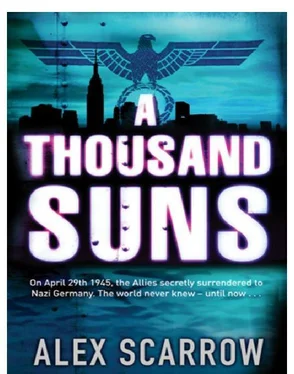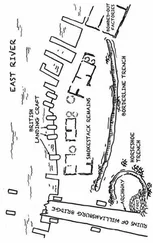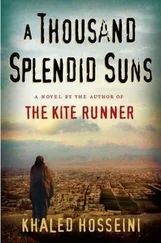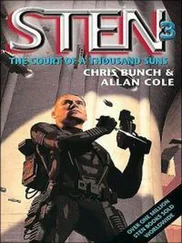Alex Scarrow - A thousand suns
Здесь есть возможность читать онлайн «Alex Scarrow - A thousand suns» весь текст электронной книги совершенно бесплатно (целиком полную версию без сокращений). В некоторых случаях можно слушать аудио, скачать через торрент в формате fb2 и присутствует краткое содержание. Жанр: Триллер, на английском языке. Описание произведения, (предисловие) а так же отзывы посетителей доступны на портале библиотеки ЛибКат.
- Название:A thousand suns
- Автор:
- Жанр:
- Год:неизвестен
- ISBN:нет данных
- Рейтинг книги:4 / 5. Голосов: 1
-
Избранное:Добавить в избранное
- Отзывы:
-
Ваша оценка:
- 80
- 1
- 2
- 3
- 4
- 5
A thousand suns: краткое содержание, описание и аннотация
Предлагаем к чтению аннотацию, описание, краткое содержание или предисловие (зависит от того, что написал сам автор книги «A thousand suns»). Если вы не нашли необходимую информацию о книге — напишите в комментариях, мы постараемся отыскать её.
A thousand suns — читать онлайн бесплатно полную книгу (весь текст) целиком
Ниже представлен текст книги, разбитый по страницам. Система сохранения места последней прочитанной страницы, позволяет с удобством читать онлайн бесплатно книгу «A thousand suns», без необходимости каждый раз заново искать на чём Вы остановились. Поставьте закладку, и сможете в любой момент перейти на страницу, на которой закончили чтение.
Интервал:
Закладка:
Fear really did seem to have a plethora of ways of expressing itself.
With a little knowledge of anthropology, one could explain away most of these symptoms of extreme stress as the body’s way of clearing the decks and preparing itself for danger. Nausea? — The body discouraging the ingestion of bulky food that might slow it down, or hamper its performance. Thirst? — A dry mouth was the body asking for water, hoarding it ready to be consumed after a burst of extreme physical exertion. Defecation? — The body ensuring that unnecessary body weight was quickly jettisoned.
Sexual arousal? — That was an odd one.
Max had a suspicion that it was the body’s desperate plea to procreate one final time, an attempt at some basic level of instinct to ensure the bloodline continued.
All of these stress-symptoms made sense. They were emergency systems designed to ready the human body to fight, flee or face death. Once upon a time, when men had fought with clubs and rocks, those stress-responses must have been invaluable. But war now wasn’t about brute strength, or swiftness of foot. It had much more to do with concentration and patience. And none of these damned symptoms helped at all.
They were made all the worse if there was nothing to do to fill in that dwindling time until zero hour. So he was thankful that for all of them there had been plenty to take care of and plenty more that needed doing in the next couple of days.
Do I get nervous? he asked himself.
More than he would ever let the others know.
‘A little bit, maybe, Stef.’
‘Oh. You never seem to look it, sir.’
Max smiled. If only you knew.
‘We’re going to be in good hands, thanks to Schroder and his men. We’re flying a tough old plane, we’re flying in secrecy and we’re heading somewhere nobody expects us to go. The wind’s in our favour, Stef. We’ll do just fine.’
‘Yes, I suppose you’re right,’ replied Stef.
‘Don’t be too hard on yourself, lad. It’s good to be a little jittery, just enough to keep you alert, keep your wits about you.’ Max slapped his back. ‘You’ve done us proud over the last year and you’ll do just as well tomorrow night.’
Chapter 28
11 a.m., 28 April 1945, a suburb in Stuttgart
Schenkelmann found the diffuse glare of the thinly overcast morning almost unbearable after months of living by lamplight below ground. His eyes still hadn’t adjusted to the brightness even though he’d been toiling in the daylight for ten minutes now. The little back street he had seen fleetingly all those months ago when they had dragged him into the building under the railway bridge and down below into the cellar did not seem to have taken any bomb damage, it looked unchanged.
He could hear the thudding of artillery shells landing nearby, or perhaps it was bombardment from above, and the sporadic crack of gunfire echoing off the empty streets.
‘Hurry up, damn it!’ said Hauser, looking up and down the cobbled back street, fear flickering across his narrow face.
Schenkelmann and his two lab assistants had nearly finished loading the weapon components into the back of the truck, where half a dozen of the SS Leibstandarte that Hitler himself had assigned to protect Hauser and the bomb sat guarding the odd-looking collection of crated items.
The U-235 mass and the two U-235 bullets had been carefully transported to the truck separately, but the altimeter trigger was the part of the bomb that needed some degree of protection from the bumping and shaking that lay ahead. This frugile component was in for a turbulent ride as the truck picked its way over cratered roads to get out of the city. The altimeter was carefully padded in a wooden crate filled with coarse sawdust. The detonators for the two U-235 bullets were also packed away in two separate caskets, safely away from the rest of the bomb.
Schenkelmann slowly finished off sealing one of the caskets, taking his time under the bored gaze of the men in the truck. As he finished up and climbed back out of the truck, he looked around. There was no sign of Zsophia and his mother. Hauser had promised they would be brought along with him when the bomb was to be moved.
A crack of rifle fire sounded nearby, its echo rattled off the stone arches running down one side of the back street. It sounded like it had come from nearby, from behind the furniture workshop that faced the bridge and cast a long squat shadow over the cobbles. Or perhaps it was closer?
Schenkelmann smiled at the obvious discomfort Hauser was experiencing. He resumed the task of packing the second detonator, slowly.
‘Hurry up!’ Hauser shouted, his nerves beginning to fray.
How close are they? A hundred yards away? Fifty yards away?
Hauser gave an order to two of his SS men to torch the cellar. They had drums of gasoline and immediately jogged into the building and started sloshing the liquid down the stairs into the lab below.
Schenkelmann lifted the casket into the back of the truck, taking his time to place it securely on the floor. Hauser was becoming aware that he was stalling for time.
‘Right, that’ll do, now get out of the truck.’
Schenkelmann made his way cautiously past the components of the bomb to the open back of the truck and eased himself down. He looked around again, still no sign of them. ‘W-where are my sister and mother?’
Hauser smiled. ‘Don’t worry about them, Joseph, you’ll be together soon. You’ve worked hard for me, and I assure you they’re fine.’
‘I want to see them.’
‘And you will, but first things first.’
There was the sound of a dull ‘whump’, and they could immediately smell burning. The two SS guards who had been sent down to set the place on fire emerged with their hands over their mouths. They were followed by the first wisps of smoke curling up the steps and out of the corrugated metal doorway.
‘Why — ?’
‘Why are we destroying the lab? Because, Joseph, we’re certainly not going to let the Americans have it now, are we?’
Americans? It’s American guns I’m hearing, not Russian. Thank God.
Schenkelmann felt a desperate surge of hope that the nightmare was nearly over. In the next street, possibly only hailing distance away, lay his salvation. Perhaps they might just capture the bomb before it was moved… capture Hauser before he got away… find his mother and sister, and reunite them all. Today it could all be over.
If they were alive still. Hauser should have brought them along, they should be here.
‘Dr Hauser, w-where are they?’ he asked.
The German smirked like a child about to play a spiteful prank. ‘Where are they, eh? Well let me tell — ’
Schenkelmann cut him off with a desperate outburst. ‘Please… I have given you everything, worked hard, please — ’
‘Oh, do shut up,’ Hauser snapped, annoyed that he had been rudely interrupted.
Gunfire again. This time much closer. Schenkelmann cast a glance down the cobbled street.
I could call out, the Americans might hear me.
Hauser looked uneasily at his men.
‘We should go now, Doctor,’ called out one of the SS guards, leaning out of the back of the truck.
‘Yes… yes, you’re right,’ he replied, and turned towards the officer in charge of the platoon of regular Wehrmacht soldiers who were going to be left behind to watch that the laboratory was properly destroyed.
‘Bosch.’ Hauser nodded to the Feldwebel and his men. ‘You know what to do. Get on with it, then.’
‘Yes, sir,’ the soldier answered with a gravelly voice.
He grabbed both the lab assistants by the arms and pulled them towards the corrugated metal wall of the archway. He let go of their arms and walked back a few feet.
Читать дальшеИнтервал:
Закладка:
Похожие книги на «A thousand suns»
Представляем Вашему вниманию похожие книги на «A thousand suns» списком для выбора. Мы отобрали схожую по названию и смыслу литературу в надежде предоставить читателям больше вариантов отыскать новые, интересные, ещё непрочитанные произведения.
Обсуждение, отзывы о книге «A thousand suns» и просто собственные мнения читателей. Оставьте ваши комментарии, напишите, что Вы думаете о произведении, его смысле или главных героях. Укажите что конкретно понравилось, а что нет, и почему Вы так считаете.











